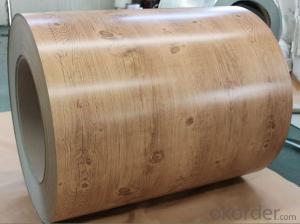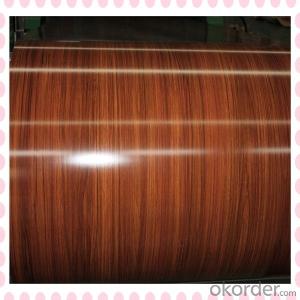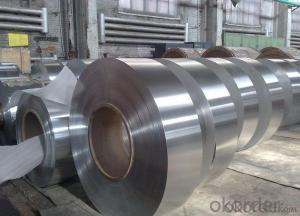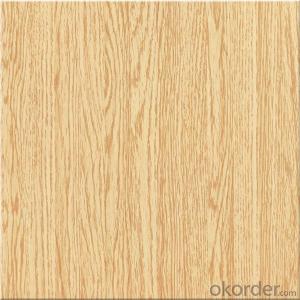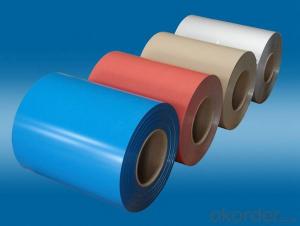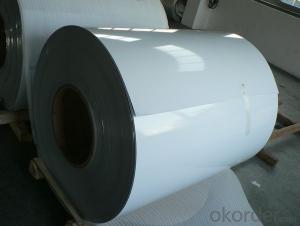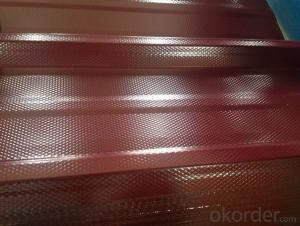Aluminum Coil for Wooden Coating Surface - Interior Wall System
- Loading Port:
- Shanghai
- Payment Terms:
- TT OR LC
- Min Order Qty:
- 5 m.t.
- Supply Capability:
- 10000 m.t./month
OKorder Service Pledge
OKorder Financial Service
You Might Also Like
Specification
1. Specification of Wooden Coating Surface Aluminum Coil for Interior Wall System
characteristics | Application |
1) Super peeling strength | 1) Building exterior curtain walls |
2) Excellent surface flatness and smoothness | 2) Decoration and renovation additions for old buildings |
3) Superior weather, corrosion, pollutant resistance | 3) Decoration of interior walls, ceilings, bathrooms, kitchens and balconies |
4) Even coating, various colors | 4) Shop door decorations |
5) Fireproof, excellent heat and sound insulation | 5) Advertisement board display platforms and signboards |
6) Superior impact resistance | 6) Wallboards and ceilings for tunnels |
7) Lightweight and easy to process | 7) Industrial materials, materials for vehicles and boats |
2. Application of Wooden Surface Coating Aluminum Coil for Interior Wall System
(1).Interior: wall cladding, ceilings, bathrooms, kitchens and balconies, shutters, doors...
(2).Exterior: wall cladding, facades, roofing, canopies, tunnels,column covers , renovations...
(3).Advertisement: display platforms, signboards, fascia, shop fronts...
3. Feature of Wooden Coating Surface Aluminum Coil for Interior Wall System
*Such coil is specially designed to replace aluminum ingot, due to the high export tax of aluminum ingot, the coil has better price than ingot.
*This type of coil can fit customer's remelting furnace just like ingot, no need to make any change to the production line that was previously used for ingot. The standard coil size and weight is very suitable for the feed gate of furnace.
*This type of coil causes less material wastage than ingot when remelted.
*Our coil is made directly from ore, no need to go though the ingot making process, quality is much better than other suppliers who use ingot scrap to make coil.
Be free from Oil Stain, Dent, Inclusion, Scratches, Stain, Oxide Dicoloration, Breaks, Corrosion, Roll Marks, Dirt Streaks and other defect which will interfere with use
4. Certificate:
SGS and ROHS(if client request, paid by client), MTC(plant provided), Certificate of Origin(FORM A, FORM E, CO), Bureau Veritas and SGS (if client request, paid by client), CIQS certificate
5. Image of Wooden Coating Surface Aluminum Coil for Interior Wall System
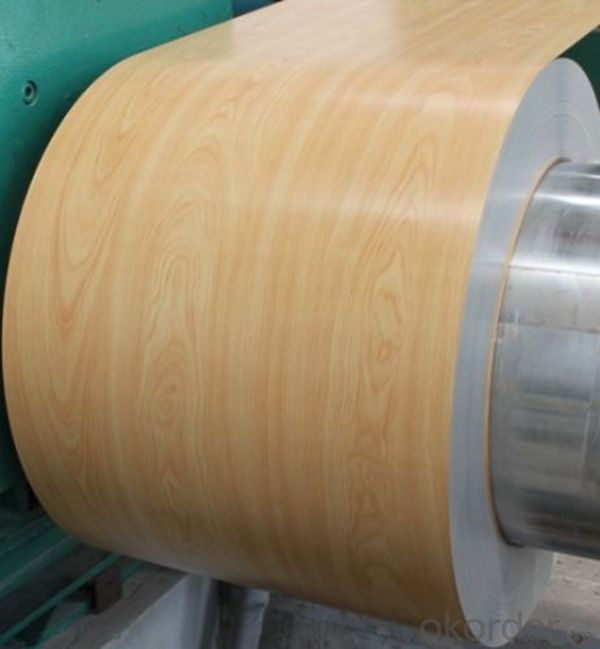
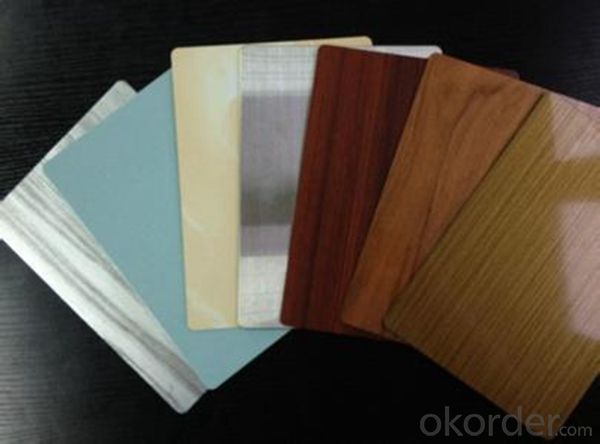
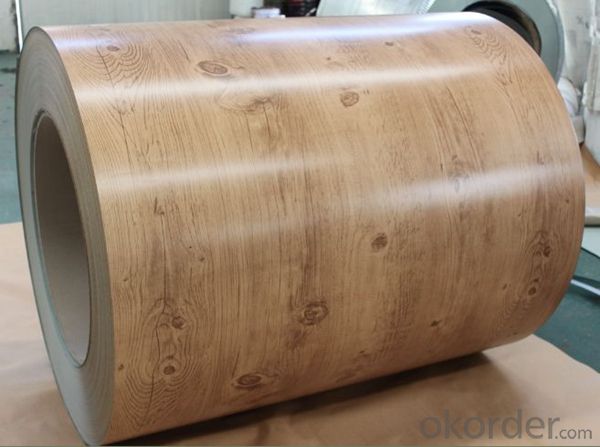
6. Package and shipping of Wooden Coating Surface Aluminum Coil for Interior Wall System
eye to wall
eye to the wall
with wood pallet (wooded case also available)
7. FAQ
1) What is the delivery time?
Dpends on actual order, around 20 to 35 days
2)What is the QC system:
We have QC staff of 20 persons and advanced equipment, each production is with MTC traced from Aluminum ingot lot.
3) What market do you mainly sell to?
Australia, America, Asia, Middle East, Western Europe, Africa etc
- Q: Are aluminum coils suitable for lightweight panel applications?
- Yes, aluminum coils are suitable for lightweight panel applications. Aluminum is known for its lightweight and corrosion-resistant properties, making it an excellent choice for lightweight panel applications. Aluminum coils can be easily formed and shaped into panels of varying sizes and thicknesses, making them highly versatile. Additionally, aluminum has a high strength-to-weight ratio, allowing for the creation of strong and durable lightweight panels. These panels find applications in various industries such as automotive, aerospace, construction, and transportation, where weight reduction is important. Overall, aluminum coils are a suitable choice for lightweight panel applications due to their lightweight nature, corrosion resistance, versatility, and strength.
- Q: What is the average lifespan of aluminum coils?
- The average lifespan of aluminum coils can vary depending on various factors such as the quality of the aluminum, the environment it is exposed to, and how well it is maintained. However, on average, aluminum coils can have a lifespan of around 15 to 20 years. With proper installation, regular cleaning, and maintenance, aluminum coils can last even longer. It is important to note that regular inspections and upkeep are crucial in prolonging the lifespan of aluminum coils and ensuring optimal performance.
- Q: Can aluminum coils be used in the production of architectural façades?
- Aluminum coils are indeed suitable for the production of architectural façades. Façades made of aluminum are highly favored due to their durability, lightweight characteristics, and aesthetic attractiveness. By incorporating aluminum coils into façade manufacturing, customization becomes effortless, as they can be readily molded and fashioned into different designs and profiles. Moreover, aluminum exhibits resistance against corrosion, rendering it suitable for outdoor use. Furthermore, it possesses exceptional thermal and acoustic insulation properties, thereby enhancing energy efficiency and soundproofing. In conclusion, aluminum coils offer a versatile and efficient choice for the creation of architectural façades.
- Q: Can aluminum coils be anodized?
- Indeed, it is possible to anodize aluminum coils. Anodizing, an electrochemical technique, enhances the existing oxide layer on the aluminum's surface, rendering it denser, sturdier, and more resistant to corrosion. This particular process finds widespread usage in aluminum sheets, plates, and coils. Anodizing can be effectively employed on both flat and shaped aluminum coils, imparting them with a plethora of appealing hues and finishes. Furthermore, the anodized coating significantly improves the aluminum's capacity to accommodate paint and adhesives, thereby rendering it a highly sought-after option for numerous applications, including architectural cladding, automotive trim, and electronic components.
- Q: What are the pros and cons of utilizing aluminum coils in storage applications?
- <p>Aluminum coils offer several advantages for storage, including high durability, corrosion resistance, and lightweight properties which make them easy to handle. They are also recyclable and have good thermal conductivity, which can be beneficial in temperature-controlled environments. However, there are downsides such as higher initial costs compared to some other materials and potential for denting or damage if not properly handled. Additionally, while aluminum is generally non-magnetic, it can be attracted to strong magnets, which might be a consideration in certain storage scenarios.</p>
- Q: Can aluminum coils be recycled multiple times?
- Aluminum coils possess the remarkable ability to be recycled numerous times. This is due to the fact that aluminum is an exceptionally recyclable substance, and its quality remains unaltered throughout the recycling process. As a result, aluminum coils can be melted and reshaped into fresh coils on multiple occasions, without experiencing any deterioration in their performance or characteristics. The act of recycling aluminum not only aids in the preservation of natural resources, but it also conserves a significant amount of energy compared to the production of new aluminum using raw materials. Consequently, opting for aluminum coils is a sustainable and eco-friendly decision, as they can be recycled multiple times.
- Q: What is the typical thickness of an aluminum coil?
- The thickness of an aluminum coil can differ depending on its intended purpose and use. Generally, aluminum coils can have a thickness ranging from 0.006 inches (0.15 mm) to 0.25 inches (6.35 mm). Thinner coils are frequently utilized for lightweight applications like packaging materials, whereas thicker coils are commonly found in industries such as construction, automotive, and aerospace, where strength and durability are crucial. It is worth mentioning that the precise thickness requirements may vary depending on the unique needs and specifications of the project or product being manufactured.
- Q: Foshan where there are high-quality aluminum and aluminum rolls for sale?
- Aluminum and aluminum Foshan volume manufacturers have a lot of, and Dali Lanshi area stores more aluminum, aluminum to choose the most important is to see where your application. Oxidation properties, thickness tolerances, surface brightness, flatness, tensile properties, crystal hardness, hardness, etc., which has the requirements, only the most suitable, there is no best (unless you do not consider the cost).
- Q: An aluminum bar 3.80 m long has a rectangular cross section 1.00 cm by 5.00 cm, what is the resistance and what is the length of a copper wire 1.50 mm in diameter having the same resistance?
- first ,we will find out the cross sectional area Area= width* height =5.3*2.1=11.13cm^2 Area=11.13 *10^-4 m^2 shear stress = force /area =3.3*10^5/11.13*10^-4=0.296*10^9 Shear stress=2.96*10^8 N/m^2 shear modulus of aluminum=2.6*10^10 pa Shear strain =stress/modulus =2.96*10^8 / 2.6*10^10 =1.14*10^-2 =0.0114 from figure, strain=x/length 0.0114=x/220 (length in mm) x=0.0114*220 x=2.508 mm Ans: Shear deformation is 2.508 mm. ===============================
- Q: What are cold rolling aluminum coil and hot rolling aluminum coil? What are their features?
- If the rolling temperature is above the crystallization one, it is hot rolling, otherwise it is cold rolling.
Send your message to us
Aluminum Coil for Wooden Coating Surface - Interior Wall System
- Loading Port:
- Shanghai
- Payment Terms:
- TT OR LC
- Min Order Qty:
- 5 m.t.
- Supply Capability:
- 10000 m.t./month
OKorder Service Pledge
OKorder Financial Service
Similar products
Hot products
Hot Searches
Related keywords
